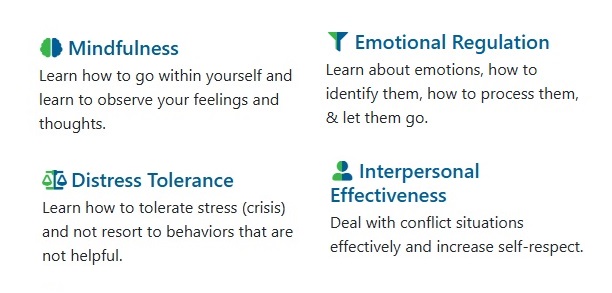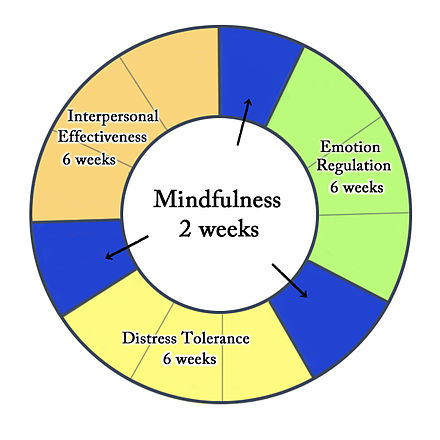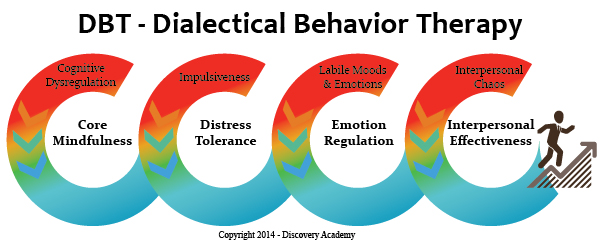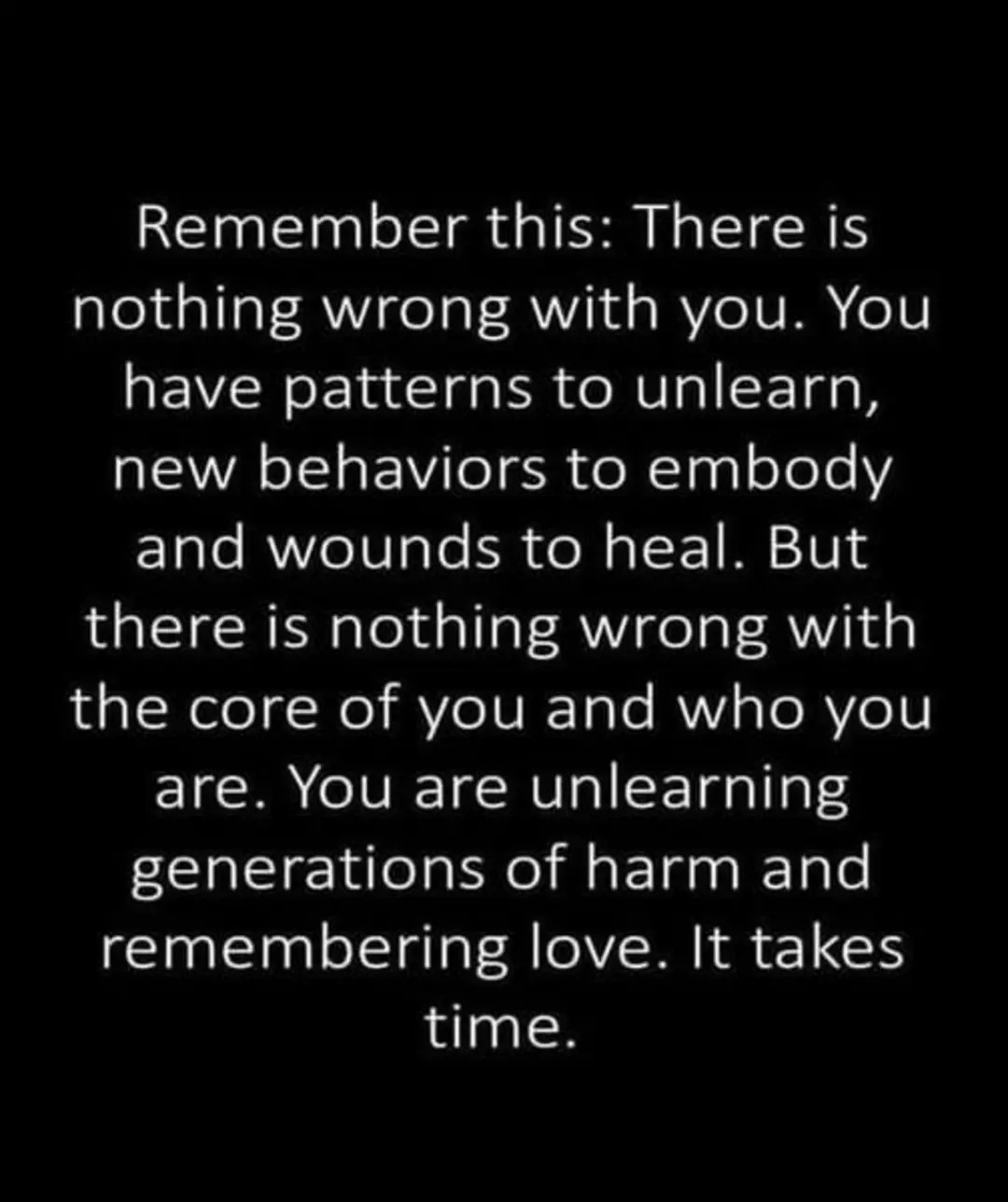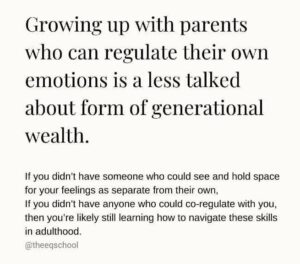 Dialectical Behaviour Therapy (DBT) is an evidence based form of psychotherapy that mostly focuses on teaching people life skills so they can learn to better create the life they want to live.
Dialectical Behaviour Therapy (DBT) is an evidence based form of psychotherapy that mostly focuses on teaching people life skills so they can learn to better create the life they want to live.
 Dialectic means two simultaneous yet opposing truths. For example: “I’m doing the best I can AND I want to be doing better.” “I’m perfectly fine as I am, AND there is room for improvement, growth, expansion.” “I accept where I am at this moment, AND I want to change my future situation.”
Dialectic means two simultaneous yet opposing truths. For example: “I’m doing the best I can AND I want to be doing better.” “I’m perfectly fine as I am, AND there is room for improvement, growth, expansion.” “I accept where I am at this moment, AND I want to change my future situation.”
Behaviour refers to how we behave towards ourselves, others and the world in general. In DBT people learn to reduce and stop behaviours that create suffering for self and others and practice and learn behaviours that create harmony for self and others.
In this short movie they show how people normally learn to regulate their emotions with supportive parenting, the mechanism is relatively simple. When children get overwhelmed by their environment a parent is there with open arms for safety so the children can regulate their emotions with a caring adult person. Once the emotion has been processed children will go out in the world to explore again, then they get overwhelmed and repeat:
Not all children have the privilege to be raised in such a way and might need to learn to regulate their own emotions later on in life. DBT can be of great help with this.
DBT focuses on four different fields:
-) Mindfulness (Observe feelings and thoughts instead of being overtaken by them)
-) Emotional Regulation (Learn to be with and regulate difficult emotions)
-) Distress Tolerance (Deal with overwhelming situations in a constructive way)
-) Interpersonal Effectiveness (Improve relating effectively to other humans)
DBT Core Mindfulness Skills
Mindfulness Skills are central to DBT. Mindfulness skills are considered “Core” skills because each of the other skills incorporate elements of mindfulness. There are three goals of mindfulness practice in DBT: reducing suffering and increasing happiness; increasing control of our minds rather than allowing our minds to control us; and experiencing reality as it is.
In DBT, there are seven core mindfulness skills. The first is called Wise Mind. Next there are three “What” skills: observing, describing, and participating. Then there are three “How” skills: nonjudgmentally, one-mindfully, and effectively.
Mindfulness skills are the first skills we learn in DBT, and they are foundation for many of the other skills. Emotional regulation and distress tolerance rely on our ability to observe and describe our experiences nonjudgmentally. And if we allow our minds to control us, emotional regulation, distress tolerance, and interpersonal effectiveness all become extremely difficult, if not impossible.
DBT Emotion Regulation Skills
We can’t control our emotions. We can’t make ourselves feel or not feel a certain way. Instead, Emotional Regulation Skills increase our ability to influence our emotions and how we feel.
In DBT, emotional regulation skills teach us to:
- Understand, name and accept our current emotions
- Change emotional responses
- Reduce emotional vulnerability
- Increase resiliency
- Increase positive emotions
- Manage strong or difficult emotions
Regulation of our emotions requires us to be able to observe and describe our current emotions nonjudgmentally. Observing and describing nonjudgmentally are core mindfulness skills, which illustrates how important mindfulness skills are in DBT, and why we learn them first.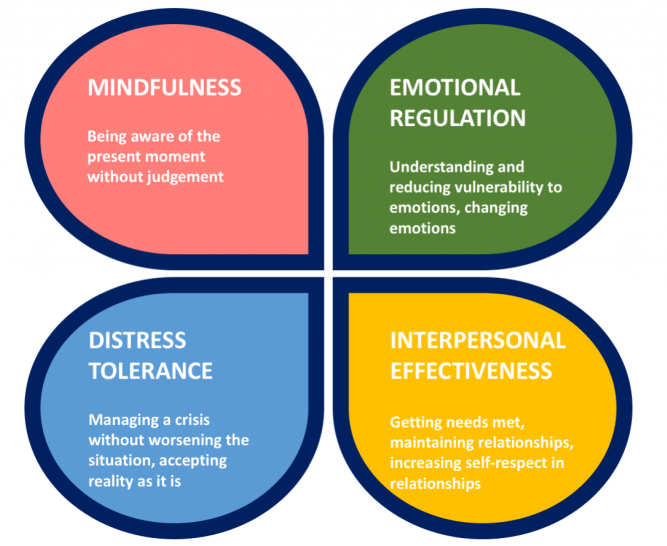
DBT Distress Tolerance Skills
In DBT, Distress Tolerance Skills help us accept, in a nonjudgmental fashion, both ourselves and our current situations. Distress tolerance skills build upon the non-judgmental acceptance we learn practicing mindfulness.
With distress tolerance we learn to:
- Perceive our environment without demanding it to be different
- Experience our current emotional state without needing to change it
- Observe our thoughts without attempting to change or control them
In DBT, there are two types of distress tolerance skills. Crisis Survival Skills involve getting through crises without making things worse. Reality Acceptance Skills help reduce suffering and increase a sense of freedom by helping us find ways to accept the facts of our lives.
DBT Interpersonal Effectiveness Skills
In DBT, Interpersonal Effectiveness Skills help us navigate interpersonal interactions more effectively, and as a result, avoid the negative emotions and damage to relationships that can accompany interpersonal conflict.
Interpersonal effectiveness skills in DBT include:
- Communicating assertively so we can get what we want and/or need from other people
- Making friends and maintaining these relationships
- Ending destructive relationships
- Finding a balancing in relationships between acceptance and change
Source: DBT Skills Training Self-Help Video Course
In this video a good introduction on DBT is given also:
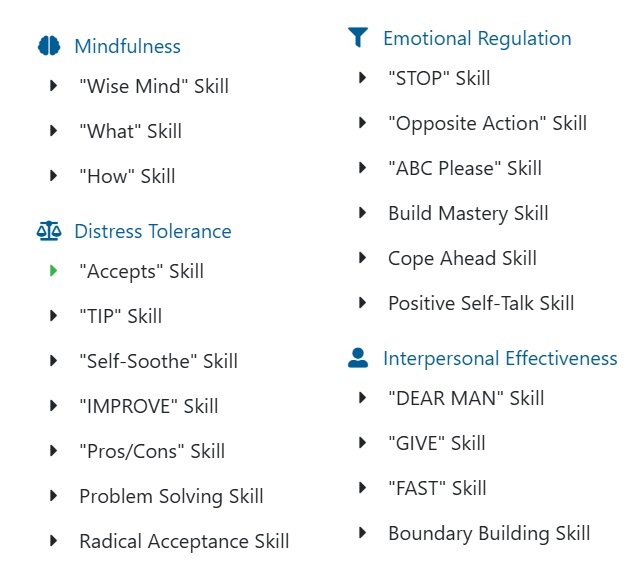 Click on the above picture to go to the DBT Tools website where you can read more about the different methods.
Click on the above picture to go to the DBT Tools website where you can read more about the different methods.
In addition there is a lot of good information you can find on Youtube also.
Here is a selection of videos from Self-Help Toons on DBT:
This article only gives a little insight into DBT but I hope it gives you enough information to decide if you want to learn more about it or not. Personally I think these are life skills that every person could benefit from learning to bring more harmony into one’s life and relationships. This will bring both Inner Peace and Outer Joy a step closer.
Useful links related to DBT:
-) The Circle of Security YouTube Channel
-) Website – DBT Tools
-) Youtube – Self Help Toons on DBT
-) DBT Skills Training Self-Help Video Course
Related articles:
-) Have a look at our free Arcturian Academy
-) Emotional Mastery – Feel the full Emotional Spectrum and learn how to process difficult emotions like shame, guilt, apathy, fear, sadness, anger, jealousy etc.
-) Mental Mastery – Part 1: How our thoughts, beliefs and belief systems influence our experience of reality
-) Mental Mastery – Part 2: Learn to investigate, turn around and transform bad feeling thoughts & beliefs
-) Loving Kindness Meditation to Cultivate Inner Peace & Harmony
-) Ho’oponopono; A Hawaiian Shamanistic Forgiveness and Healing Technique
-) Forgiveness Meditation – ask for forgiveness of others, forgive yourself, forgive others

